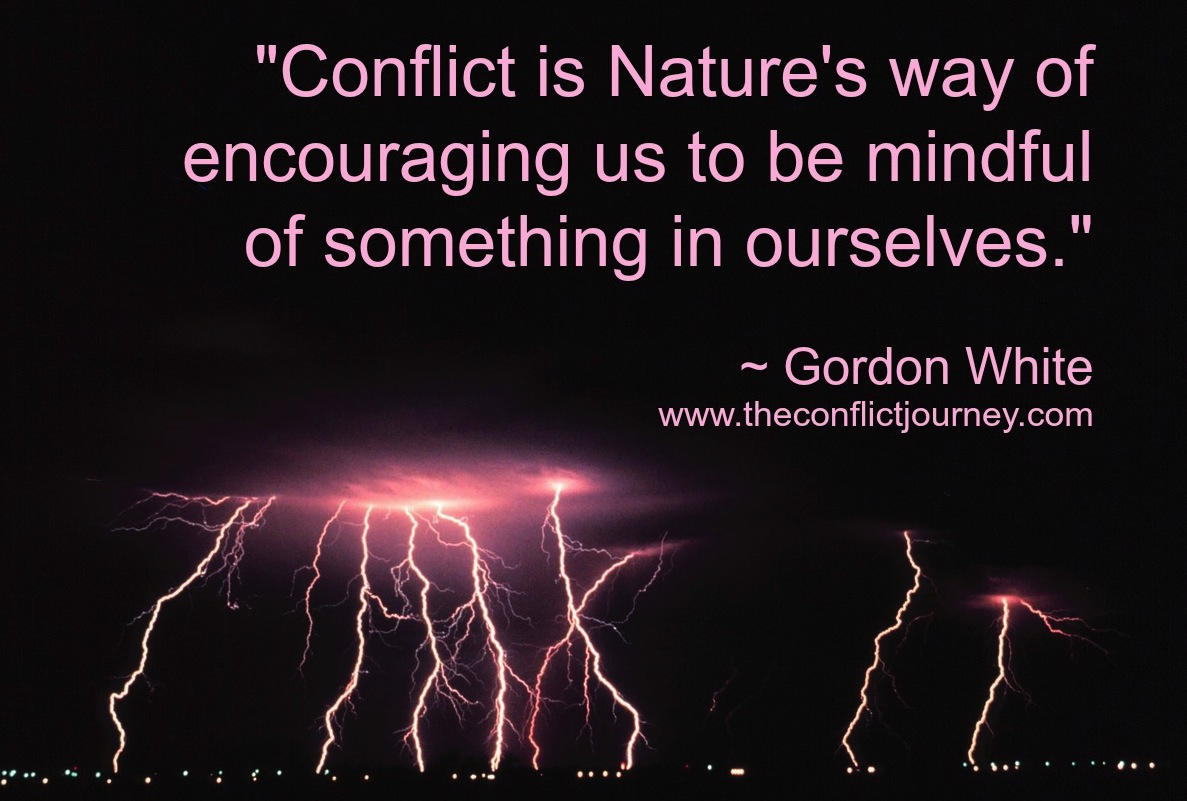Cinnie Noble recently raised the topic of conflict and spirituality in her LinkedIn group, the Conflict Coaching Guild. This is a topic close to my heart and one I will likely return to in future posts. Through the lively discussion Cinnie started, I discerned a division in approaches to spirituality in conflict.
The first approach applies spiritual strength and wisdom to empower one’s capacity to respond more effectively to the conflict.
A second approach, which is not mutually exclusive to the first, entails a significant attitudinal shift. It views conflict itself as spiritual.
Spirituality is a difficult term to define. In its current usage, it is often used to refer to beneficial experiences that are deep, meaningful, or significant to life as a whole.
One contributor to the LinkedIn discussion, Lorraine Segal, wrote about three aspects of spirituality relevant to her practice. Conflict is an opportunity to view the universe as a benevolent (in some sense, caring) rather than a hostile place. Conflict is an opportunity to learn the value and peace that comes from forgiveness. Conflict is also the ground in which Segal developed her intuitive connection.
Others wrote about being guided or informed by spiritual grace – an extra-human gift of love and intelligence. Practitioners wrote about the strength they derived from their own spiritual practices. Another experience was a spiritual awakening to larger purpose or greater meaning on the part of clients that gave them the wisdom required to solve their differences.
These are examples of the first approach where spiritual experience provides the strength and capacity required to respond effectively to conflict, where conflict is viewed as something to be worked through or overcome.
Alternatively, one contributor reported that a friend had recently told him he was benefiting from engagement in a conflict. I was reminded of some Buddhist expressions: When you come to a fork in the road, take the more difficult path. That is, be in the conflict rather than try to resolve it. This is akin to the more visceral Buddhist expression of ‘leaning into the sword’ after being stabbed. Perhaps the friend was savouring the pain of his conflict and growing from that attitude of full engagement with it.
This second approach and worldview does not deny the first, but it does add a new avenue for responding. The conflict itself is viewed as meaningful, valuable, and in some sense spiritual. The conflict is Nature’s way, or if you like, the Creator’s way of forcing us to be mindful of something in ourselves that needs attention. Pain in the body draws our attention to physically caring for ourselves. Pain in the psyche including all the psychic and emotional discomforts of a conflict tries to draw our attention to the inner working of ourselves. We tend to miss the message by blaming out and finding fault with the other. But, look where the pain lies. It is a pain of the self, and perhaps that is where the discomfort suggests we look.
I have considered conflict as having a potentially sacred quality for some years and it significantly informs my philosophy. Translating my views into practice with mediation and coaching clients has been slower, but here is one way that I try to do that. I find I can sometimes benefit my clients by attempting to create a ‘space’ where they can sit in the conflict without fleeing it, and without escalating it. They are able to observe the conflict with some respect and wonder. Perhaps in those moments I sense the spirituality of the conflict itself.
At first my clients may not understand what I mean when I ask a question such as, “What do you now see is the core difference between you?” They will tend to revert to blaming each other as in, “This is about his lack of responsibility.” To such a statement a mediator can respond, “Yes, you see him as irresponsible, and he sees you as callus. What do these perspectives tell you about your differences?” Possible answers might be:
“We don’t like each other.”
“We are going to destroy our relationship if we keep this up.”
“We have to get past our differences if we want to save the company.”
“We’ve never taken the time to learn how to work together.”
“Neither of us are doing what we want with our lives.”
“We are continuing the battle our parents fought.”
“We’re both stubborn as hell.”
As psychotherapists have known for some time, what we resist tends to persist, whereas full acceptance allows possibilities for growth. Through seeing the conflict clearly and accepting it, a greater truth about the conflict arises.
If you find the idea possible or preposterous, let me know.
Thanks for reading,
Gordon

